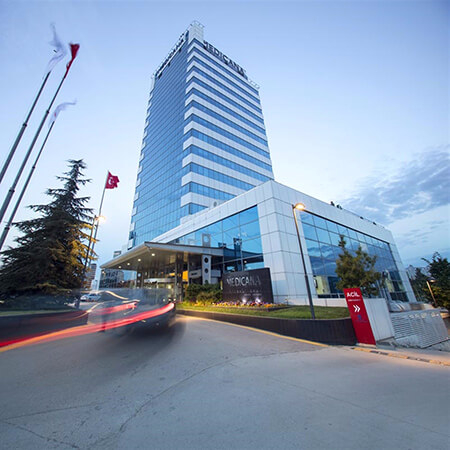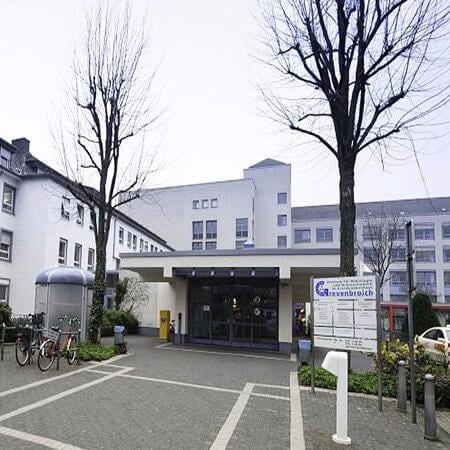Obesity is a widespread aesthetic and medical problem. According to the WHO data, over 50% of Europeans are overweight and over 20% of them are diagnosed with obesity. Obesity treatment abroad is carried out step by step: physicians start with lifestyle modifications and proceed with weight-loss medicines, weight-loss devices, and bariatric surgeries. Specialized centers offer a comprehensive approach, when a patient undergoes diagnostics and receives treatment in one healthcare facility, with one physician. Careful adjustment of treatment scheme to a patient’s current need makes slimming easy and safe.
Content
- Conservative approaches to weight loss
- When you should consider surgical treatment
- Features of childhood obesity treatment
- Leading hospitals and prices for treatment
Treatment starts with lifestyle modifications, work with psychotherapists and taking medicines. In absence of the desired effect, a doctor may offer bariatric surgery.
You can contact Hospital St. Elisabeth Grevenbroich, HELIOS Clinic Krefeld, or Academic Municipal Hospital Karlsruhe. The full list of hospitals is available at the Booking Health website.
Undergoing treatment of obesity abroad will be easier with Booking Health – the international medical tourism provider. Booking Health provides you with information about hospitals and treatment prices, makes an appointment in the desired hospital, takes care about visa and flight, provides you with an interpreter, and much more.
Conservative approaches to weight loss
Conservative measures are the first-line option, as they are sparing and are more likely to have a stable long-term result. These include:
- Healthy eating plan
- Additional physical activity
- Taking medicines
- Work with a psychotherapist
Healthy eating plan determines the number of meals per day, portion sizes, caloric value and list of the recommended foods. Common recommendations include consuming fewer foods with added sugars and trans fats. The diet should be rich with vegetables and whole grains, low-fat dairy products, and lean meat.
Physical activity plan includes walking 10,000 steps daily in combination with 2-3 training sessions with an instructor weekly. Medical contraindications are carefully considered when planning physical activity.
Taking medicines for the treatment of underlying pathologies (e.g. hypothyroidism, insulin resistance, diabetes mellitus) or as reducing aids (drugs that disrupt digestion, reduce appetite, etc.). All medicines must be administered by a doctor, especially in case of obesity in children.
Work with a psychotherapist allows identifying psychological reasons that make you overeat, causes of sleep disturbances, depression, etc. A professional will also create a positive attitude towards the process of losing weight and manage your self-doubt and anxiety.
If with these measures body mass remains excessive during 6 months, a physician may recommend more advanced options – bariatric surgery.
When you should consider surgical treatment
Endocrinologists abroad recommend surgical treatment in addition to the conservative measures in such cases:
- Body mass index (BMI ) is over 40 kg/m2 against the background of conservative treatments.
- BMI is from 35 to 40 kg/m2, but a patient has complications of obesity. These are type 2 diabetes mellitus, arterial hypertension, joint pathologies, sleep apnea, ischemic heart disease or myocardial infarction, etc.
- BMI is from 30 to 35 kg/m2, but a patient has decompensated type 2 diabetes mellitus with numerous complications (kidney insufficiency, diabetic retinal angiopathy, etc.)
However, there is a precondition. A patient must be ready to fulfill all the recommendations of his physician and adhere to a healthy lifestyle after the surgical intervention. Surgery makes slimming faster and easier, but a patient still needs to work on the issue. In addition, a patient must have no contraindications to the surgical intervention.
Surgeries for the treatment of obesity
Obesity surgery abroad uses three basic methods:
- Restrictive method. It reduces the volume of the stomach, so a patient simply eats less. This group of surgeries includes placement of an intragastric balloon, sleeve gastrectomy, and gastric banding.
- Malabsorptive method. It disrupts digestion of the consumed food, so a patient does not receive calories. Being not the first-line option, this group of surgeries includes biliopancreatic diversion.
- Combined method. Gastric bypass reduces volume of the stomach and suppresses absorption of nutrients in the intestine.
Surgeons give preference to endoscopic and minimally invasive interventions. Such surgeries are associated with fewer complications and a more smooth postoperative period.
As more sparing options, weight-loss devices may be used. These are electrical stimulation systems that block nerve signals from the stomach to the brain and gastric emptying systems that simply drain a consumed food out of the stomach.
Leading hospitals and prices for treatment
When choosing among numerous hospitals abroad, a patient should pay attention to a hospital’s success rates, qualifications of healthcare professionals, availability of modern equipment, etc. Also, it is worth paying attention to independent ratings, based on the patients’ experience. Thus, several of the leading clinics are:
- Medicana International Ankara Hospital, Turkey
- Hospital St. Elisabeth Grevenbroich, Germany
- HELIOS Clinic Krefeld, Germany
- Academic Municipal Hospital Karlsruhe, Germany
- Baskent University Hospital Istanbul, Turkey
Costs of treatment depend on the country and the healthcare facility. For instance, the price for the placement of an intragastric balloon in the Medicana International Ankara Hospital is 5,800 EUR, and in the Hospital St. Elisabeth Grevenbroich it is 5,300 EUR. You can find the full list of prices on the Booking Health website.
Authors:
The article was edited by medical experts, board certified doctors Dr. Vadim Zhiliuk and Dr. Sergey Pashchenko. For the treatment of the conditions referred to in the article, you must consult a doctor; the information in the article is not intended for self-medication!
Sources:
Centers for Disease Control and Prevention
MedicineNet
Sience Direct












